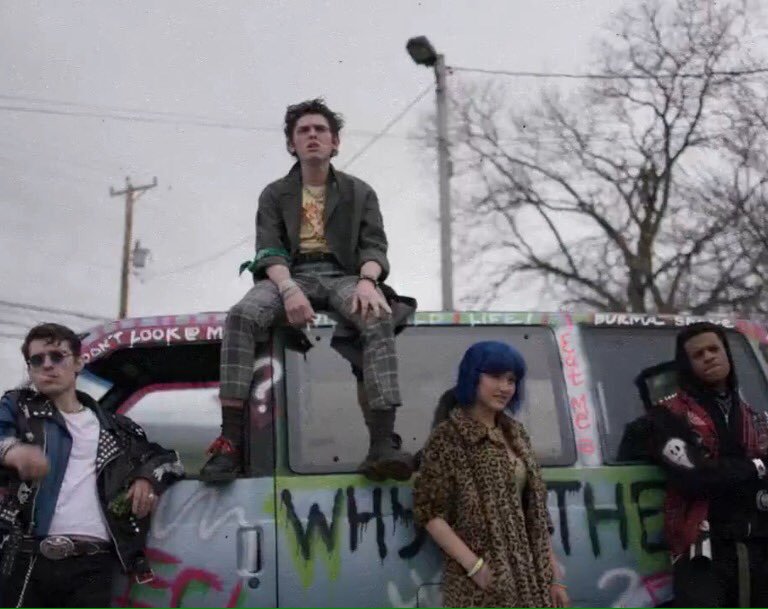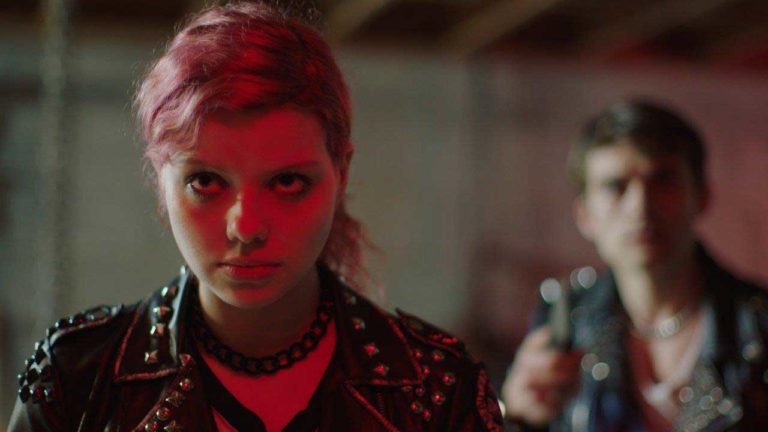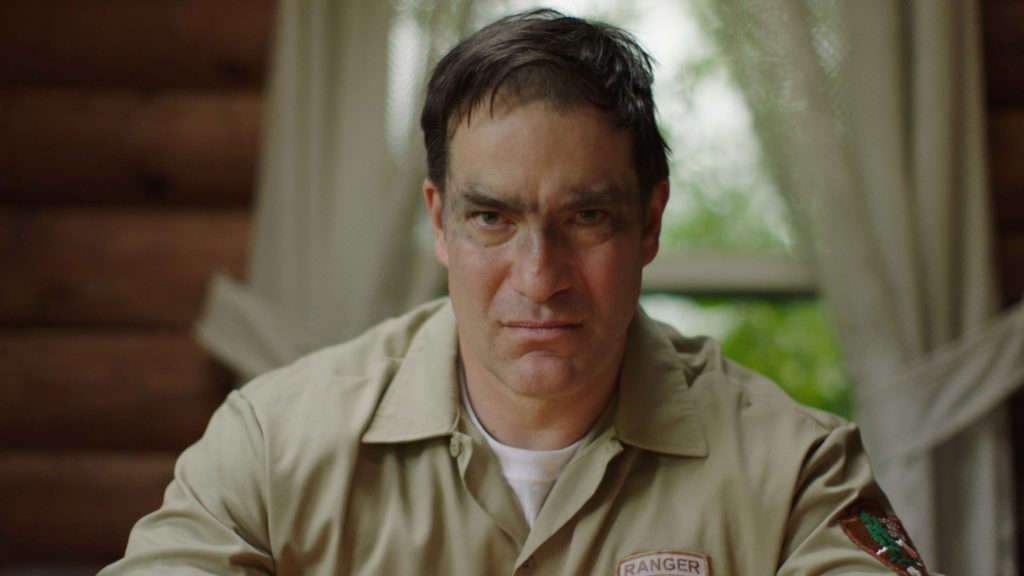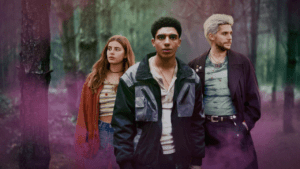Summary
The Ranger is like many other films, but it definitely has a character all of its own and is very entertaining. I thought it might be a fun-but-standard slasher, and I’m glad to say there was lots more to it than that.
The Ranger is about Chelsea (Chloë Levine, The OA) and her mates, late teens, members of a punk band which cannot make up its mind about a name, who drive off in a friend’s van when they suddenly find themselves in trouble with the police. They take some time out in Chelsea’s late uncle’s hunting cabin, in the middle of a national park: great for some breathing space, but a completely alien environment to most of them. As a group, they are used to rejecting authority and taking care of each other, no matter what… but they are completely clueless about how to deal with the single man in charge of the park.
I’m not giving anything away that you wouldn’t see on a poster if I tell you that even though it’s five against one, the group of friends are no match for the (unnamed) Ranger (played menacingly by Jeremy Holm, House of Cards). And even though he keeps his park clean of city trash with violent fervor, this doesn’t make it simply a “slasher”. If you think any film that involves a single-minded killer versus a group of young “innocents” is a slasher, I’d recommend checking Wikipedia for its succinct definition. The Ranger is known to the victims in this film (at least to one degree or another), and tries to steer them away from his territory, or at least behave right while they’re there (“violators will be punished”). And The Ranger is certainly a lot more than “stalk-and-murder sequences”, with several tropes overturned or bettered, showing imagination and wit on behalf of Jenn Wexler, writer (with Giaco Furino) and director.
For example, even though the body of the film takes place in or around a cabin in the woods, neither the cabin nor the woods are the root of any scares: they form a sanctuary until that sanctuary gets disturbed by the man himself (see also Leave No Trace). There is depth and history to the “final girl”, not just guts and resilience. And although the killer himself may not have been “reactivated or re-inspired” by an anniversary, it may be said that someone else in this film is: a witty way to bring a new angle on an old scenario. The Ranger did not have any of the tongue-in-cheek or camp tones that many slashers did: humor was minimal, found more in mild stupidity being caught out than in jokes of any kind. There was something interesting about the actual violence and gore: sure, some of it was “extreme” by nature, but the camera never lingered too long, and nor was the blood super glistening, or the screams over-the-top. Oh, and no-one is punished for sex, or for being a virgin; the same-sex couple isn’t viewed salaciously, even.
I’m no aficionado, but this is not what I’m used to in a “traditional” slasher.

The writing and production styles of this film, together, were fascinating, and very entertaining: even though the plot, in general, stretched credibility, a good deal of what is on the screen is very easy to accept. The Ranger is less than ninety minutes long, but still allows us enough time to get to know all the key characters, which helps a lot; as does the choice of authentic locations (the nightclub and the cabin). The cinematography makes the rural setting real, and the interesting effects while Chelsea is high make her reactions believable too. And I have to praise the depiction of the punk culture and attitudes, in which Wexler clearly felt at home: these kids could have been taken straight out of a real dive, like the ones in Green Room; and The Ranger is as respectful to the love of punk as The Devil’s Candy was to metal.
The characters, in general, were beautifully drawn, even those who were given little detail. The most detail is given to Chelsea; this is her film as much as the Ranger’s himself. She clearly feels nostalgic towards the cabin, as well as drawn to the countryside; but gradually various things remind her of something tragic that happened there ten years or so ago, via flashbacks showing the younger Chelsea (Jeté Laurence, Pet Sematary) and her uncle (Larry Fessenden, Small Crimes, Southbound, etc.). At one point, her boyfriend Garth (Granit Lahu) yells that she’s always been a tourist in their city scene, and the writing makes it very clear how it messes with her to bring that city scene into her forest retreat: she has issues with where to belong more than your typical punk teen. And she is truly striking in appearance: pink hair and huge round eyes mean Chelsea would look just as fitting in anime.

By contrast, the Ranger himself has an exaggerated personality… but only just. He may be a slight caricature, just enough to make viewers and punk characters alike realize that he’s a little off, but he is certainly no cartoon. Actually, this is a good point to mention that, more than Green Room, The Ranger reminded me at times of Wolf Creek (or Wolf Creek 2, when the Ranger got a bit ranty): in a similar way, this film was about people out of their depth in someone else’s realm; someone who lived and breathed that place.
Anyway, in case you hadn’t worked it out, I enjoyed The Ranger a great deal. I’m only sorry I didn’t catch it at any of last year’s festivals but thank Media for Shudder! Having been a horror film producer for some years, Jenn Wexler was the first female director to have a film open London’s Frightfest in 2018, and she’s recently produced Fessenden’s new film, Depraved. The Ranger had such a unique and enjoyable character, I will certainly be looking out for more.



